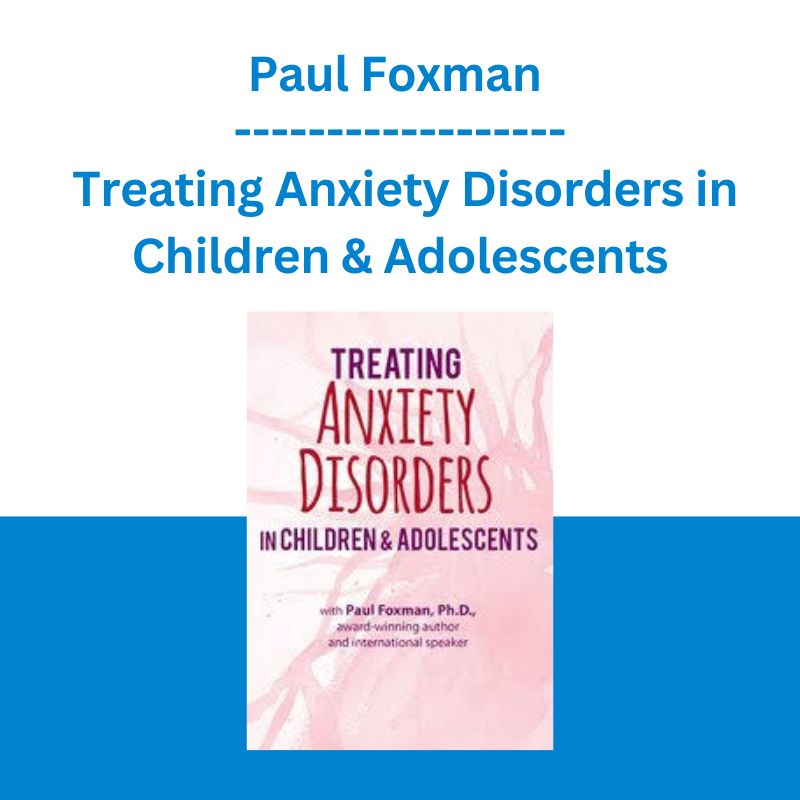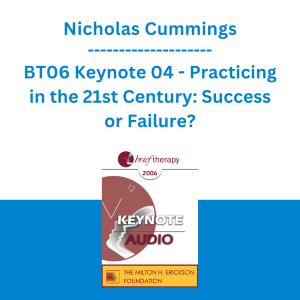*** Proof of Product ***

Exploring the Essential Features of “Paul Foxman – 2-Day Certification Training: Treating Anxiety Disorders in Children & Adolescents”
Divorce, family breakdown, violence in society and the media, has produced a “shell shocked” generation of kids suffering from anxiety!
Purchase this 2-day recording to join anxiety expert and author Dr. Paul Foxman, who will demonstrate how you can “connect” with anxious children and inspire them to practice new self-regulation skills. You will learn how to help parents (“bulldozers”, “helicopters” and “snowplows”) and schools to gain confidence, gratification, and success in helping their most anxious kids.
To increase your effectiveness with the various manifestations of child anxiety, Dr. Foxman will address each of the following disorders with case examples and clinical vignettes:
- Separation Anxiety Disorder
- Panic Disorder
- Generalized Anxiety Disorder
- Obsessive-compulsive disorders (including skin picking and hair-pulling)
- Social Anxiety Disorder/Selective Mutism
- Specific phobias
- Trauma- and Stressor-related disorders
Emphasis will be on creative psychotherapy involving insight-oriented, cognitive-behavioral, biological, mindfulness, and family systems interventions.
Handouts
| Manual – 2-Day Intensive Workshop on Treating Anxiety Disorders in Children & Adolescents (3.36 MB) | 60 Pages | Available after Purchase | |
| Illinois Educators Self-study Instructions (28.5 KB) | Available after Purchase | ||
| Illinois Educators Evaluation Form (1.2 MB) | Available after Purchase |
Outline
DAY ONE
Sources of Anxiety and Treatment Overview
- What research tells us about therapy effectiveness applied to children
- How anxiety develops in children: the “Three Ingredients Framework”
- Biological sensitivity
- Anxiety personality style
- Stress overload
- Treatment goals, strategies, and recommendations
- The baseball analogy for behavior change and symptom reduction
- Behavioral health recommendations
Interventions: Stress Management and Anxiety-Regulation Skills
- The 1st intervention: “3-S” process for stress management
- Symptoms
- Sources
- Solutions
- The 2nd intervention: anxiety regulation skills
- ”Relaxation Response”
- Breathing practices
- Mindfulness practices for children
- Flow activities
- Yoga games
- Martial arts
- ”Baby Buddhas” meditation for preschoolers
- Other approaches to self-regulation
School Recommendations, Medication, DSM-5® Classification, and Interventions for Separation Anxiety Disorder
- Recommendations for schools
- Pros and cons of medication
- DSM-5® anxiety disorders: current updates
- Separation anxiety
- Normal separation process
- Therapeutic exposure
- ”Helicopter”, “bulldozer” and “snowplow” parenting
- Strategies to help parents let go
Interventions for Generalized Anxiety and Panic Disorder
- Generalized anxiety
- Why we worry
- Introducing language for new thought patterns
- 9 strategies for replacing worry with alternative cognitive habits
- Panic disorder
- Diagnosis and treatment success rate
- Agoraphobia component
- Treatment metaphors
- ”Floating Technique”
- ”LifeSkills” Self Help Program
DAY TWO
Interventions for Obsessive-Compulsive Disorders
- Obsessive-compulsive disorders: expanded classification
- Relationship between obsessions and compulsions
- Trichotillomania (hair pulling)
- Excoriation (skin picking)
- Body dysmorphia
- PANDAS (medically induced OCD: Pediatric Autoimmune Disorder Associated with Streptococcus Infection)
Interventions for Social Anxiety Disorder and Selective Mutism
- Social Anxiety Disorder
- Selective mutism
- Self-esteem issues and treatment
- Social communication skills
- Group therapy
Interventions for Phobias and Stressor- and Trauma-Related Disorders
- Specific Phobias
- Diagnosis and examples
- Virtual reality exposure
- Stressor- and Trauma-related disorders
- Expanded diagnostic classification
- Attachment disorders
- Adjustment disorders
- Acute stress disorders
- Trauma-related disorders
- New frontiers in trauma treatment
Wrap Up
- Therapy progress measures
- Case consultations
Faculty
Paul Foxman, Ph.D. Related seminars and products:7
Vermont Center for Anxiety Care
Paul Foxman, Ph.D., has led hundreds of workshops throughout the U.S. and Canada, and he has appeared on television and radio as an expert on the topic of anxiety. His books include The Clinician’s Guide to Anxiety Disorders in Kids & Teens (PESI, 2016), Dancing with Fear (Hunter House, 2007) and award-winning The Worried Child (Hunter House, 2004). He also co-authored a casebook, Conquering Panic and Anxiety Disorders (with Glatzer) (Hunter House, 2002). Dr. Foxman is known for his knowledge and clarity, sense of humor, compassion, and engaging speaking style.
Dr. Foxman is a clinical psychologist, as well as founder and director of the Vermont Center for Anxiety Disorders. In 1985 he co-founded the Lake Champlain Waldorf School in Shelburne, VT, now flourishing from kindergarten through high school. Dr. Foxman has over 40 years of clinical experience in a variety of settings including hospitals, community mental health centers, schools and private practice.
Dr. Foxman’s education includes Yale University (B.A. in Psychology), Peabody College of Vanderbilt University (Ph.D. in Clinical Psychology), and training at the Department of Psychiatry of Mt. Zion Hospital in San Francisco, the Kennedy Child Study Center in Nashville, and the San Francisco Psychoanalytic Institute.
Speaker Disclosures:
Financial: Dr. Paul Foxman is the founder/director of the Center for Anxiety Disorders. He is an author for Hunter House and receives royalties. He is an author for Jason Aronson, Inc. and receives royalties. He is an author for Da Capo Press and receives royalties. He receives a speaking honorarium from PESI, Inc.
Non-financial: Dr. Paul Foxman co-founded the Lake Champlain Waldorf School.
Please see the full list of alternative group-buy courses available here: https://lunacourse.com/shop/










 Greg Loehr - Advanced Option Trading With Broken Wing Butterflies
Greg Loehr - Advanced Option Trading With Broken Wing Butterflies  Nicholas Cummings - BT06 Keynote 04 - Practicing in the 21st Century: Success or Failure?
Nicholas Cummings - BT06 Keynote 04 - Practicing in the 21st Century: Success or Failure?